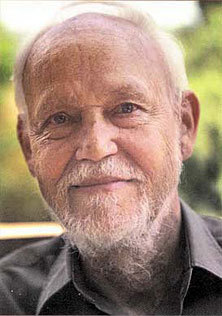
A year that brought the passing of too many important public figures capped it off with the death of the past century's leading explainer of religion and the roles it plays in people's lives. Huston Smith died peacefully in his Berkeley California home, at age 97, on December 30th, after a long, steady weakening that had those who knew him scratching their heads about how he lingered so long and remained so lucid. He was beloved for his wit, his decency and the joy he derived from good company and stimulating conversation, and he was revered for his unparalleled contributions to the study of the world's religions.
Born in 1919 in China and raised there by missionary parents, Smith came home to America at 17 and pursued his studies in religion and philosophy. Always a self-identified Methodist, he was an indomitable explorer long before spiritual eclecticism became fashionable, and his investigation was never the kind of shallow pursuit he advised against, comparing religious dilettantes to people at a buffet who get too much of what they want and not enough of what they need. He plunged deeply into traditions other than his own, not just as a scholar but as a seeker of spiritual illumination. He practiced Zen meditation; he practiced disciplines from the Sufi branch of Islam; he practiced yoga, famously bending and stretching his tall, lean body to demonstrate asanas (postures) in a 1950s film that launched his public career and again, in 1996, on Bill Moyers' five-part PBS series, "The Wisdom of Faith with Huston Smith." By then, he was, as the Christian Science Monitor put it, "Religion's Rock Star."
The non-Western tradition that had the biggest impact on Smith, and by extension all of his readers and students, was Hinduism--specifically, the Vedanta school of Hinduism, whose essence is articulated in the Upanishads and the Bhagavad Gita. When I asked him how influential Vedanta was in his life, he was 88 and already frail, but he straightened up in his chair and his voice boomed "Immense!" As a young scholar beginning his first teaching job, at Washington University in St. Louis, he was advised to look up Swami Satprakashananda at the local Vedanta Society. On his first visit, he purchased a copy of the Katha Upanishad. "I was overwhelmed in just two pages," he told me, "astonished by how much truth could be compressed into so few words. I was hooked."
He was tutored on Vedanta by the learned swami for the next ten years. Those studies would inform his entire body of work, which in turn influenced the way millions of people understand religion, especially religions other than their own. Vedanta's delineation of different spiritual approaches for different personality types "came as a welcome revelation," he said. So did the core insight captured in the Rig Veda dictum usually translated as "Truth is one, sages call it variously." That perspective is known in scholarly circles as Perennialism, and Huston Smith described it better for laypeople than just about anyone, with the possible exceptions of his friends, Joseph Campbell and Aldous Huxley.
For advocating the underlying unity of the world's religions, he was mistakenly accused of saying all religions are the same. This naive critique ignores the distinction Smith made throughout his distinguished career--between the exoteric aspects of religion (rituals, forms, behavioral codes, stories, etc.) and the esoteric (direct inner experiences). "Exoterically, they're very different," he said, "but esoterically they are one." That is, whatever pathway one might follow, if it is taken to its highest level it leads one to the same mountaintop as travelers on other paths.
His seminal textbook, The Religions of Man (later retitled The World's Religions), first published in 1958, reflects that point of view. It was also unique in its day in that it took religion seriously. Scholar of religion Dana Sawyer, the author of an authorized biography of Smith titled Huston Smith: Wisdomkeeper, says, "Rather than trying to explain religion away, as so many of his colleagues did in the 1950s, Huston claimed the right to love what he studied. . . . By emphasizing the value of religion rather than its drawbacks, and by describing the religions in ways that their adherents could recognize, Huston opened fresh perspective on religion." The book was a landmark, Sawyer adds: "To treat the religions as equals was unusual, since there tended to be a Christian or Western bias at the time. When they were treated as equals it was as antiquated curiosities, all equally useless, not as relevant sources of wisdom."
Smith never stopped exploring and advocating, through his books, media appearances and countless lectures around the world. His was a sane voice, against fundamentalism and extremism and for pluralism (he helped get the Dalai Lama into the U.S. for instance). In the 1960s, already famous, he took part in the psychedelic experiments of Timothy Leary and Richard Alpert (later Ram Dass). He was considered the grownup in the crowd, warning against the cavalier use of drugs and pointing out that the goal of spiritual experience was not just altered states but altered traits.
It is not an exaggeration to say that Huston Smith's fingerprints are on most of the changes in how we in the West have come to approach spirituality in the last half century. As one who was charmed by him in two memorable encounters, profoundly instructed by his work and honored to have him write the foreword to one of my books (American Veda), I join his admirers and loved ones in celebrating his uniquely significant life.
